Luxury homes, short lets and shacks: inside Lisbon’s housing crisis | Housing

Manuela Lopes dates her misfortune from the moment her Lisbon neighbourhood began attracting comparisons with Brooklyn. It was the mid 2010s: former warehouses in the old working-class parish of Marvila were giving way to co-working spaces, art galleries, artisan breweries, creative hubs and tech startups. In 2018, average property prices in the neighbourhood were up 79.8{30865861d187b3c2e200beb8a3ec9b8456840e314f1db0709bac7c430cb25d05} on the previous year.
A short walk from Lopes’ home, a 12-building luxury residential project designed by the world-famous architect Renzo Piano is now rising from Marvila’s old industrial waterfront. Prices for apartments, some with balconies overlooking the Tagus, range from €500,000 to €925,000 (£425,000 to £786,000) and many have been sold off-plan. Promotional material for Prata Riverside Village promises a “new way of living Lisbon” for “young families, students, digital nomads and retired people” in a district “distinguished by its true neighbourhood atmosphere; quiet but full of life” .
Lopes, 77, was born in the more modest architectural setting of the Santos Lima, a two-storey 19th-century apartment building, where her mother and grandmother before her raised their families. The “true neighbourhood atmosphere” was indeed here in the early 1970s, according to former tenants, when dissidents of the Salazar dictatorship would gather for their clandestine meetings at the Santos Lima.
For years, Lopes assumed her tenancy was protected by a Portuguese law that prevents anyone over 65 years old from eviction if their lease dated from before 1990. What she didn’t know was that an offer to move flats within the building, which she had accepted, had voided the terms of her previous lease and in 2017, she was given notice to quit.
Across Lisbon, property prices were soaring, tourism was booming and many tenants were finding themselves in a similar predicament. Lopes and her neighbours discovered after receiving eviction notices that the Santos Lima had been sold for €2.7m, even though 17 families were sitting tenants. Just a few months later the building was on the market for €7.2m, advertised as having potential for conversion to private condominiums or a hotel: perfect for a rapidly gentrifying area of the capital on the riverfront. And empty.
Lopes has lost count of the strange encounters she has had in the building since then. Unnamed people started showing up in the corridors, telling tenants to leave. Doors to vacant flats were pulled out, before being re-attached months later, and construction work began without notice.
With most elderly residents protected from eviction, some landlords resorted to bullying to be able to cash in on the boom, says Rita Silva, who heads housing rights organisation Habita. Lopes and her neighbours say what they have experienced is closer to intimidation. People again speak in hushed, fearful voices; suspicious not of the Salazar regime, but of the faceless owners and property agents.
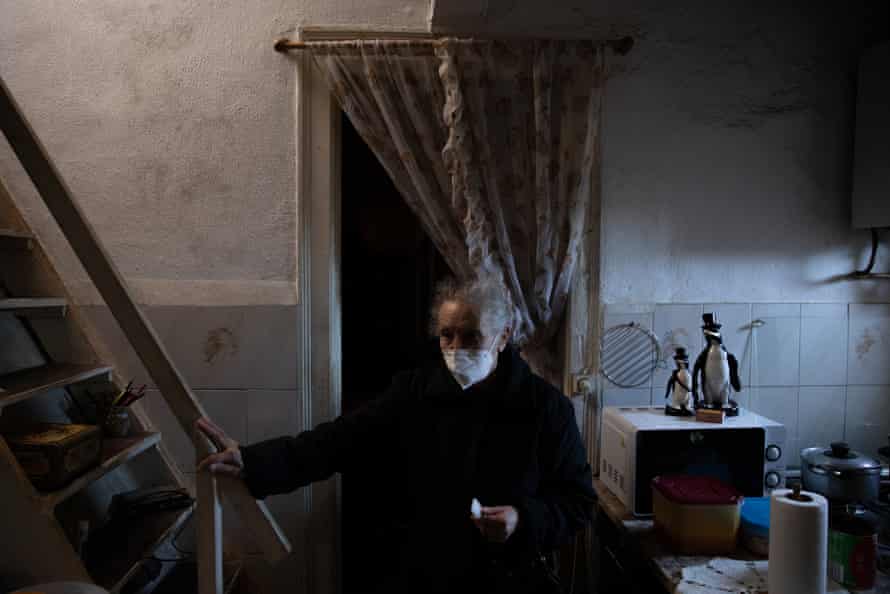
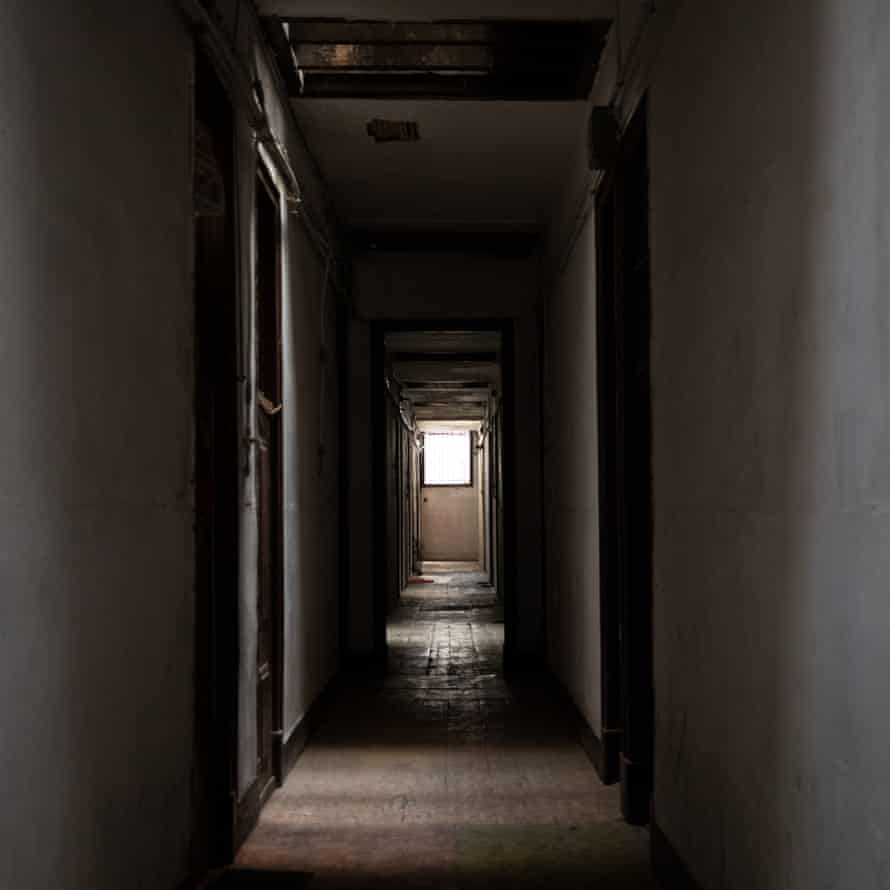
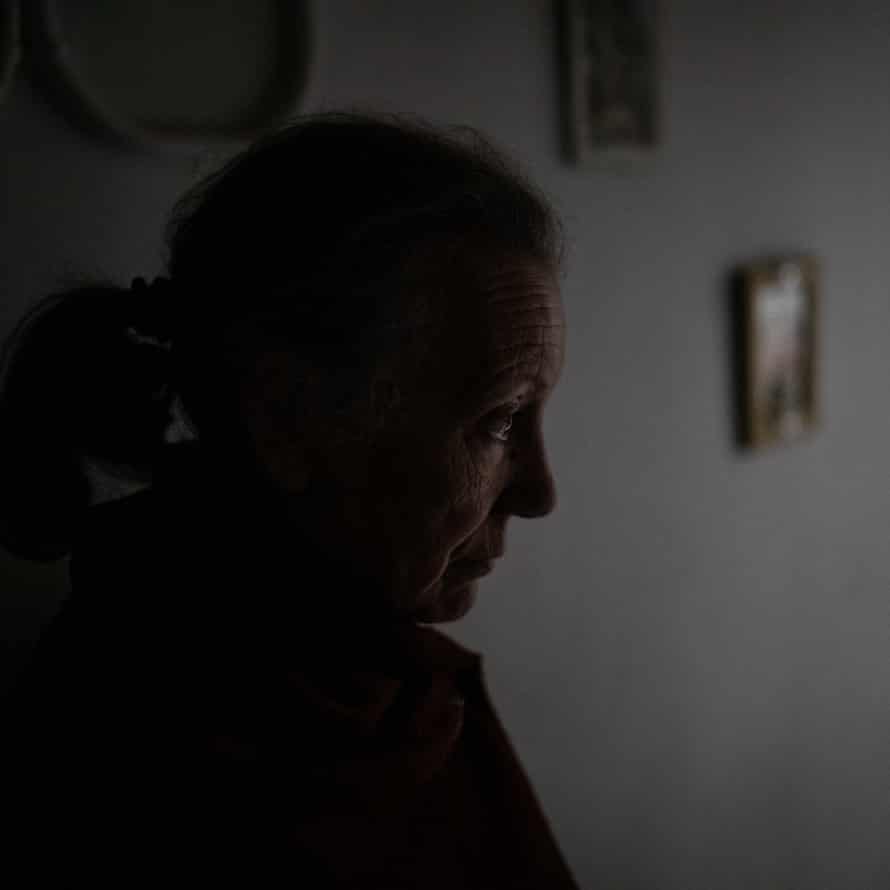
The building itself is becoming more dilapidated by the day. Inside Lopes’ flat, the walls have dark patches from damp and mould. On the door of one of the many empty flats, decorations are still up from a previous Christmas.
“There is no use in painting my place now, I don’t know when I’ll have to leave. I barely have any energy left,” she says.
Some of the remaining families are holding out, but Lopes, who lives on a pension of less than €400 a month, €147 of which goes on rent, has begun to pack up her things. “I’m scared of the day someone shows up and I’ll just have to go.”
“My doctor says I’m halfway into a depression,” she adds. “All of this just makes me feel small.”
Portugal’s property market is now what analysts call one of Europe’s most “dynamic”. Foreign investment is credited with powering Portugal’s economic recovery, but the “collateral damage” inflicted on the social fabric of Lisbon, Porto and other cities has been profound, says geographer and housing activist Luís Mendes.
Unaffordable rents and evictions are hitting not just those on subsistence wages or pensions, but ordinary workers and their families. Their plight can be traced to the 2008 European debt crisis. To entice foreign investment, Portugal was required to deregulate as a condition of its international bailout. A “golden visa” programme was ushered in offering residency permits in exchange for real-estate acquisitions worth €500,000 or more. Those investing were not required to move to Portugal – just to spend two weeks a year in the country. A separate “non-habitual residency scheme” was also brought in, which gave foreign citizens who spent half the year in Portugal a 10-year tax break on income earned elsewhere.
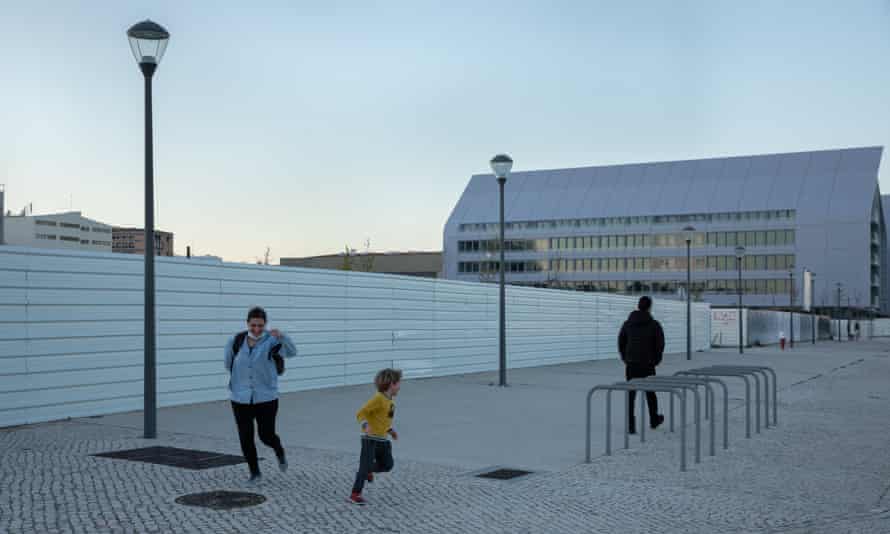
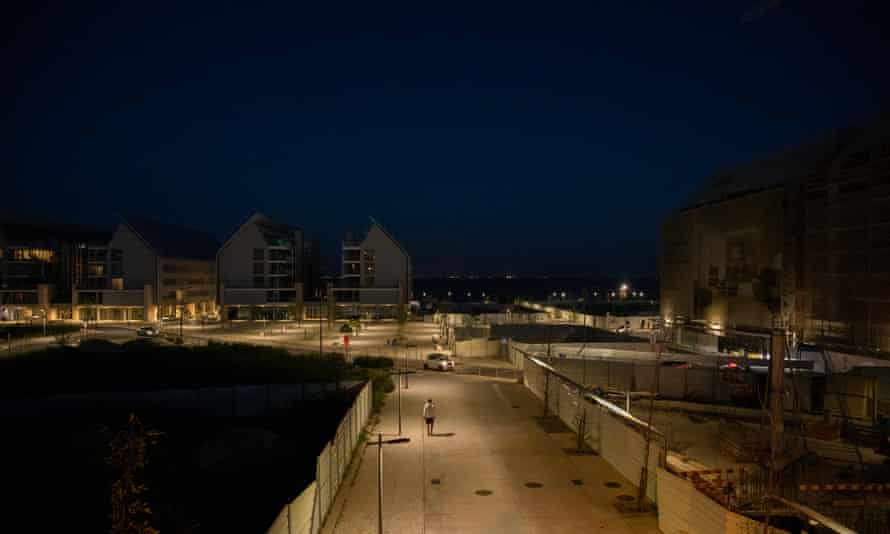
To say these schemes proved popular is an understatement: 10,000 golden visas have been issued to non-EU buyers since 2012 in exchange for more than €5bn of investment, most of it flooding into property. The new property owners come predominantly from China, Brazil, Turkey, South Africa and Russia.
Luís Lima, president of the Portuguese association for professionals and companies in real-estate mediation (Apemip), has no doubt that the perks gave Portugal an important “escape” from the worst effects of the financial crisis.
“Everything that is good for tourism is good for us,” Lima says. He was among the first to begin scouting foreign investment abroad after the crisis in 2008, and recalls: “Some of the maps didn’t even have Portugal on them, they just had ‘Iberia’ – now everybody knows our name.”
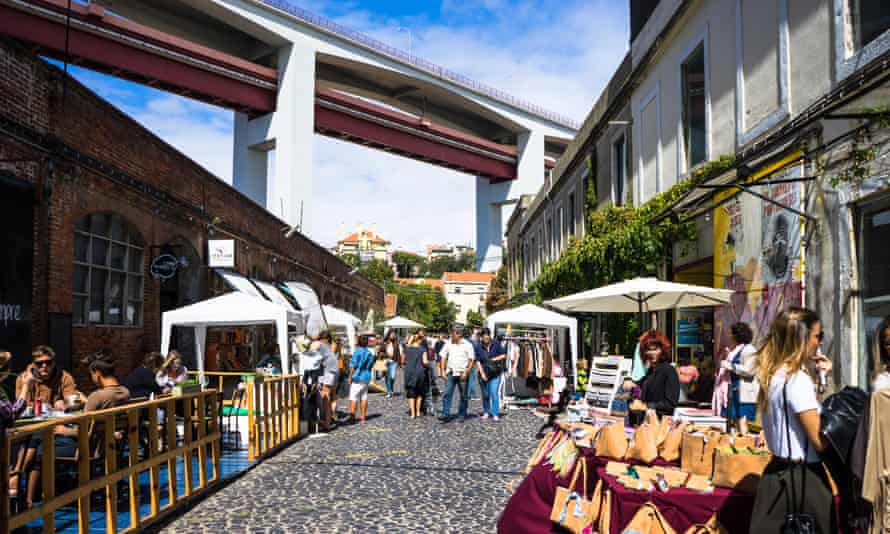
-
The Sunday market at the LX Factory complex, a former industrial site now home to bars, cafes, restaurants and shops. Photograph: Brannon Gerling/Alamy
While the Algarve had formerly drawn international real-estate buyers, Lisbon, Porto and some of the coastal regions in between now became a honeypot for developers and speculators. “We changed the paradigm,” says Lima, adding that the scheme has been good for employment, indirectly creating “thousands of jobs”.
But Mendes, who is on the board of the Lisbon tenants’ association, says that by turning so much of the capital’s housing into wealth-generating assets the scheme has been “disastrous” for many Lisbon-dwellers.
Countless people saw their need for homes sidelined as prices soared and the safety net for renters was swept away. A 2012 austerity measure designed to address “rigidities” in the urban rental market became known as the “law of evictions”. Suddenly a tenant could face a dramatic rent hike at the end of a lease or be evicted if a landlord wanted to renovate a flat, which was previously unheard of. By 2017, eviction rates had doubled on 2013 rates, to the equivalent of approximately five families losing their homes a day.
Historically a residential centre, Lisbon rents had been cheap by the standards of other capital cities in Europe but they were in line with Portugal’s lower average incomes. As interest from abroad began to grow, demand outstripped supply, pushing prices up and pushing people out.
That supply shortage narrative is only the “tip of the iceberg”, as Mendes puts it. Lisbon also had an unusually high number of vacant houses until around 2010. At least a third of buildings in the historical centre were vacant, many in a state of degradation, Mendes says. It was a golden opportunity for investors.
In the frenzy that followed, buildings were changing hands for €1m one night and selling the next morning for €1.7m. “Sometimes with only mild renovations, properties bought for €60,000 or €70,000 six years ago are now worth €400,000 or €500,000,” Mendes says.
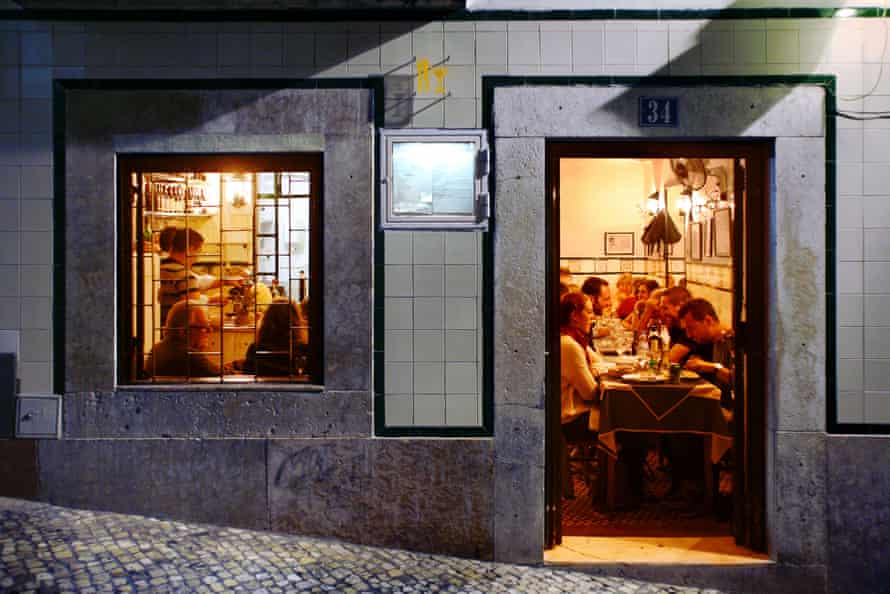
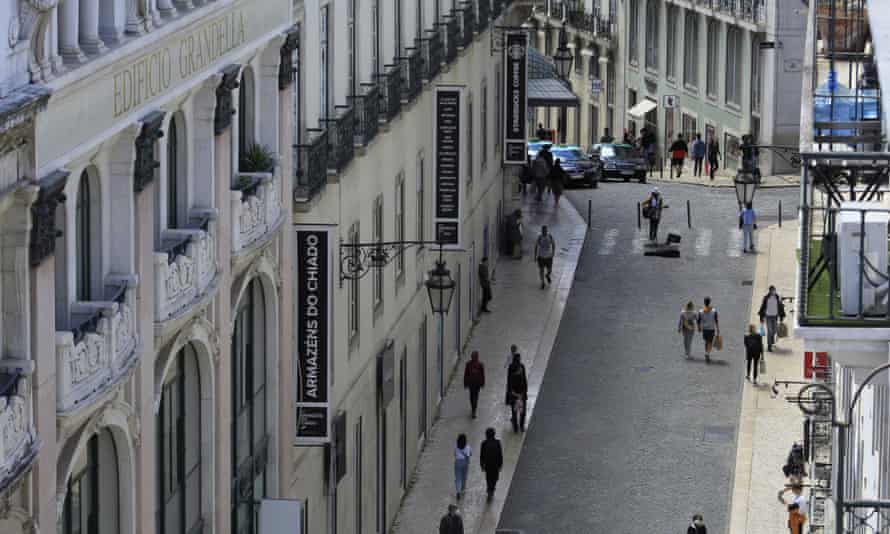
Tourism, meanwhile, introduced Lisbon to Airbnb-style short-term rentals. “Anyone could have a room or a sofa they would rent,” explains Mendes. Short lets, he says, began to “eat” into the affordable housing market.
Once full of decrepit buildings, faded masonry and crumbling facades, the old town was made over at breakneck speed. Tuk-tuks filled with tourists climbed up and down the narrow cobblestoned streets and restaurants flourished. It was not long before Lisbon began topping international league tables as a tourism destination and one of the most “liveable” cities in Europe.
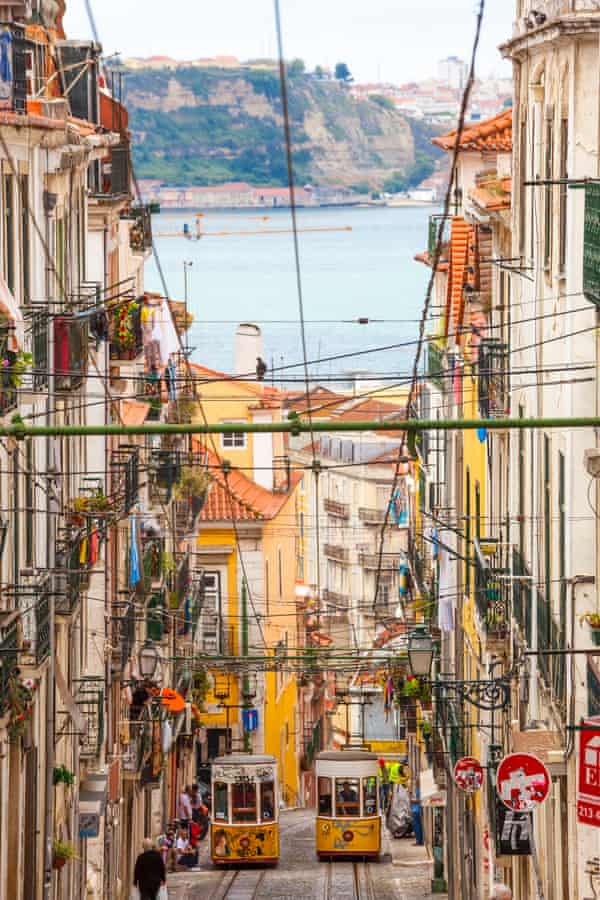
By 2019, Lisbon was averaging 4.5 million tourists annually, in a city of 500,000 residents, more than eight tourists for every resident. By 2020 a third of houses in Lisbon’s historical centre were listed on short letting websites such as Airbnb, despite curbs introduced in 2019.
The warning issued by Leilani Farha, the UN special rapporteur on housing, in 2016 was coming to pass. Farha had said that “unbridled touristification” in Portugal could exacerbate evictions and bring about the emergence of “a new poor”.
Anyone on Portugal’s minimum wage of €665 a month was certainly priced out. Today the average rent in Lisbon, for a family, averages €700-€900 a month depending on the district, but average earnings in the city are about €950. “A lot of people are excluded,” Mendes says.
In 2020, house prices across Portugal increased by 8.4{30865861d187b3c2e200beb8a3ec9b8456840e314f1db0709bac7c430cb25d05}, according to the national statistics institute (INE). “It is not just vulnerable groups that can’t access housing, for the past three years the middle class has had a noose around its neck – they can’t find housing in Lisbon,” says Silva. “When you look at incomes in Portugal house prices are absurd.”
‘I just want to live with dignity’
Dulce Dengue and her children were woken early one morning in March 2021 by men yelling at them and rummaging through the furniture of their rented flat in Loures, a town in the Greater Lisbon area, 13km north-east of the city centre. “I didn’t even have time to wake my children properly, within minutes two men were changing the locks and told me I had to leave,” she says. She was served with a court order to vacate the premises.
Dengue had lost her jobs as a cleaner and a seamstress at the start of the pandemic. She admits she had not been able to keep up with her rent.
The circumstances of the case are still the subject of legal proceedings. But the single mother, her own three children – the youngest just 18 months old at the time – and two nieces found themselves without a roof over their heads. Four other families who had been living in the same block also ended up homeless.
“We had to stay outside in the cold, it was awful, I had to feed my children on the street,” she says.
Property inflation has now rippled out from Lisbon to outlying municipalities such as Loures, say campaigners. “It is almost like aftershocks of an earthquake,” says Silva. Mendes agrees: “It has moved from the epicentre … out through the city peripheries and suburbs.”
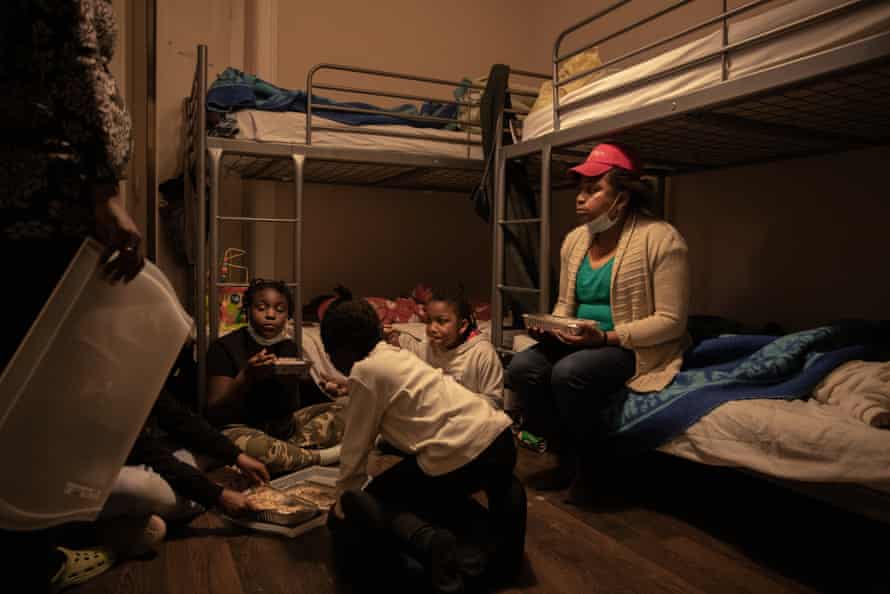
-
Dulce Dengue, her three children and two nieces were removed from a block in Loures, a town in the Greater Lisbon area. Photographs: Goncalo Fonseca/The Guardian
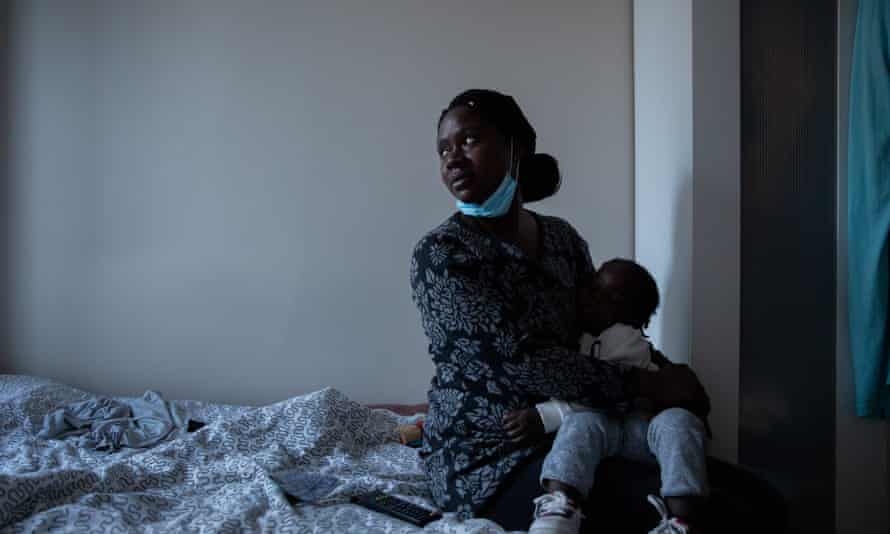
The difficulty for people like Dengue is that Portugal also has one of the lowest rates of social housing provision in Europe, with only 2{30865861d187b3c2e200beb8a3ec9b8456840e314f1db0709bac7c430cb25d05} of all housing publicly owned, compared with 17{30865861d187b3c2e200beb8a3ec9b8456840e314f1db0709bac7c430cb25d05} in the UK, 16{30865861d187b3c2e200beb8a3ec9b8456840e314f1db0709bac7c430cb25d05} in France and 24{30865861d187b3c2e200beb8a3ec9b8456840e314f1db0709bac7c430cb25d05} in Austria.
She was initially placed in a hostel paid for by the local authority. Her children were exhausted, as it took an hour to get to school, she says. “They kept asking me when we could go home.” The courts eventually revoked Dengue’s notice to quit, a decision that is being appealed. In the meantime, the family have been shuffled between hostels and temporary shelters.
“I ask for assistance,” Dengue wrote in an open letter to the housing minister earlier this year. “I don’t know how to deal with the tears of my children who don’t know when they will return home. I don’t know how to deal with the uncertainty of life, with the coming and going, sometimes I feel myself losing strength to keep fighting. I just want to give a dignified life to my children. I just want to live with dignity.”
“Dulce’s case is an example of many things that are boiling in this country – people losing their income in the pandemic, particularly people who were already in a precarious situation,” says Silva.
The “build to rent” market, meanwhile, has taken off on the capital’s margins. Loures is attracting a steady stream of buyers of what the Portuguese branch of JLL, an international real estate company, calls “multifamily assets” – residential buildings entirely for rental purposes.
Gonçalo Santos, the head of capital markets at JLL, is adamant that the golden visa programme has played a positive role in consolidating Lisbon as an investment destination in the global marketplace. That, he says, is entirely compatible with the creation of affordable housing. Taking Lisbon out of the golden visa scheme, as the government plans to do next year, will not just be “terrible for business”, it will reduce the supply of homes, he says.
11,000 families in shacks
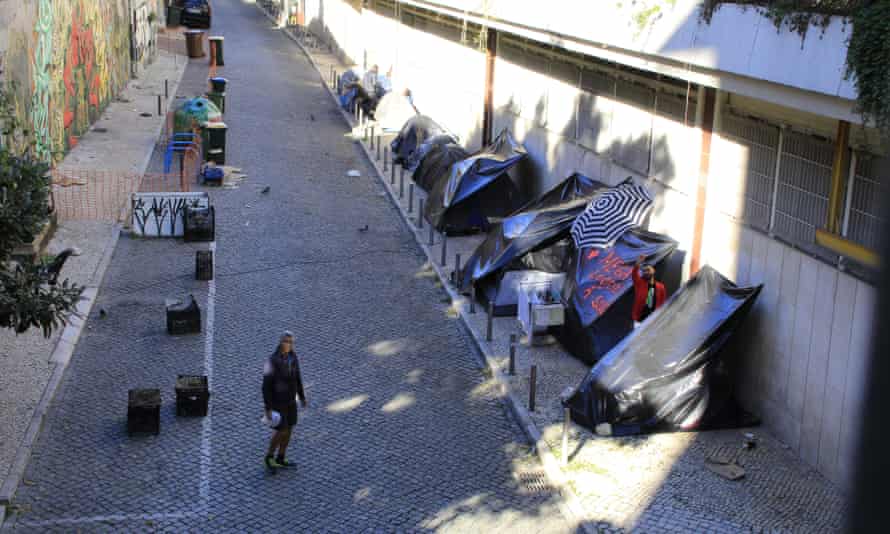
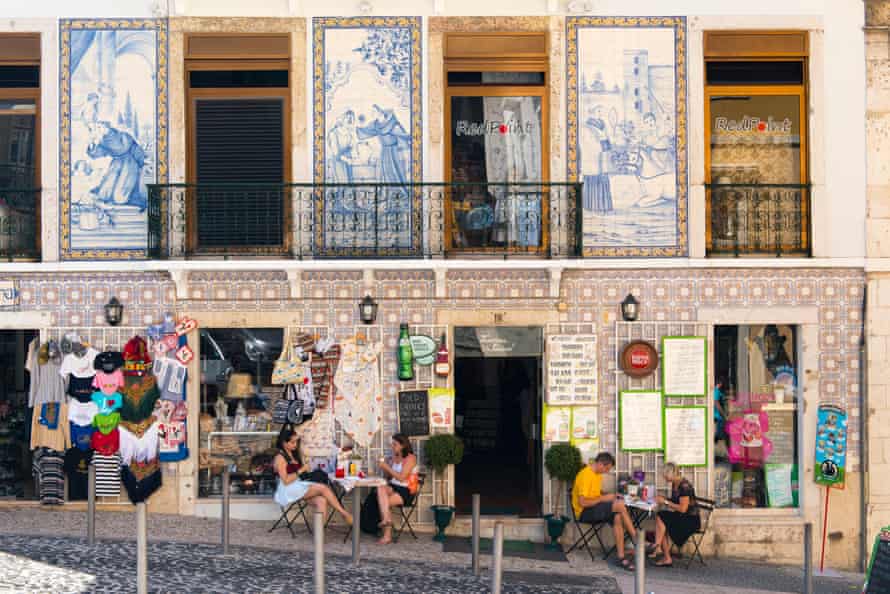
Faced with mounting public pressure the Portuguese government established a housing secretariat in 2017, and in answer to a growing protest movement a law giving effect to the constitutional right to adequate housing dating from 1976, was finally approved in September 2019.
The first comprehensive government inquiry into housing, published in response to the findings of the UN special rapporteur on housing revealed that 25,762 families were living in “grave housing poverty”, nearly 50{30865861d187b3c2e200beb8a3ec9b8456840e314f1db0709bac7c430cb25d05} of them in Lisbon.
These are people in what Silva calls “situations of degradation often without access to running water”. More than 11,000 families live in shacks and self-built dwellings clustered in shantytowns or other “informal settlements”. Astonishingly these figures do not include overcrowded homes or households at risk of eviction.
The housing secretary, Marina Gonçalves, says the government’s priority is to increase social housing’s share from 2{30865861d187b3c2e200beb8a3ec9b8456840e314f1db0709bac7c430cb25d05} to 5{30865861d187b3c2e200beb8a3ec9b8456840e314f1db0709bac7c430cb25d05}. But she acknowledges “this will take time”.
For decades, she says, housing in Portugal was left to market forces. Public housing was not prioritised. “We have to find the answers, we can create market incentives, but we can’t think the responsibility lies with the market, the responsibility lies with the state to promote public housing policies.”
When the pandemic struck, the government suspended evictions and introduced a temporary moratorium for people in mortgage arrears. But in the absence of a massive programme of public investment in housing, Mendes believes, the pandemic is storing up a wave of future evictions and a potentially explosive crisis.
“It was already grave and will become aggravated as people’s economic and social situation becomes more precarious,” Silva agrees. “The price of housing did not decrease with the pandemic – housing remains inaccessible in Lisbon.”
The cleaners and carers who live in squats
Dam works as a security guard in a supermarket, where she is on the minimum wage doing nightshifts. Despite being in paid employment, the single mother lives in a squat in a vacant, vandalised council flat on Lisbon’s outskirts.
She moved here when conditions in the flat she had been renting became so unsanitary that staying was not an option. In the squat, the windows are broken so she keeps the blinds down to keep out the cold. “When I got here, the rubbish was higher than me, the walls were filthy.”
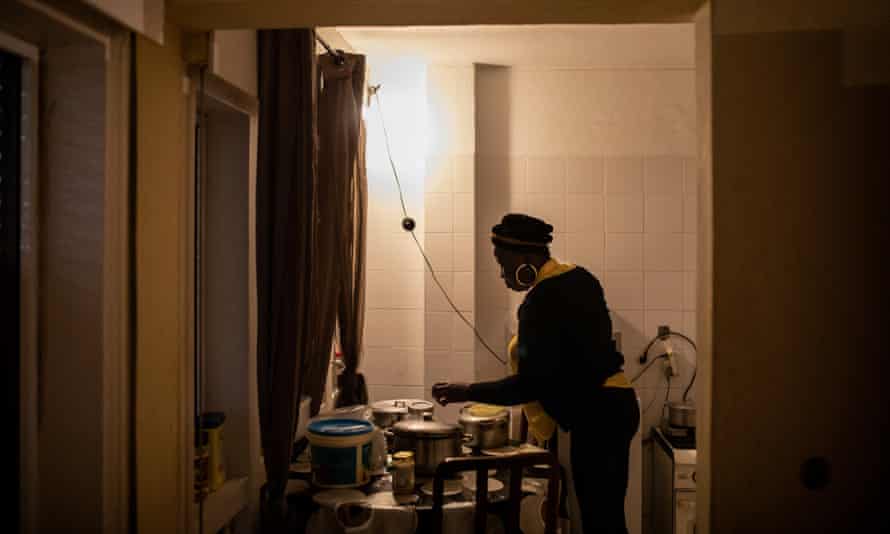
-
Dam lives in a squatted local authority block of flats with her children; her disabled mother, whom she was also caring for (right), died in November from pneumonia. Photographs: Goncalo Fonseca/The Guardian
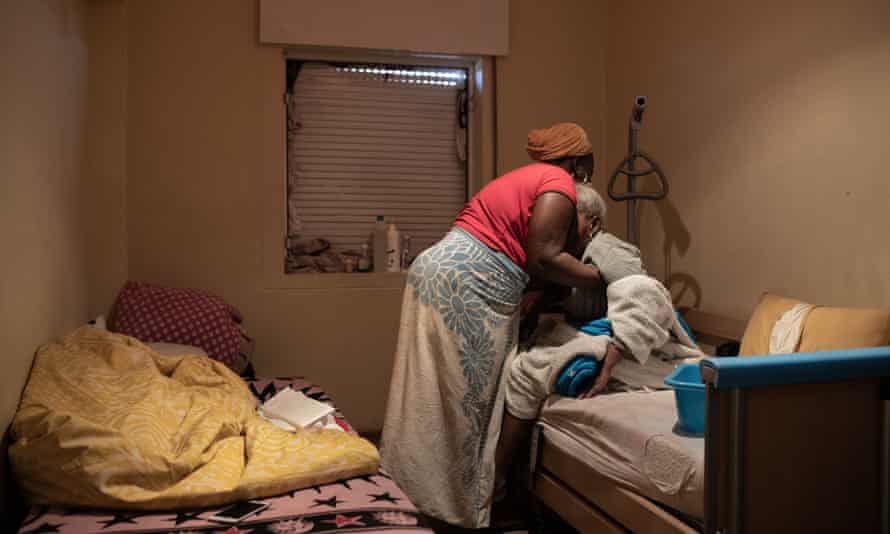
Dam, 40, supports two of her children and until recently was also the main carer of her disabled mother, who has since died from pneumonia. The family has been on a waiting list for public housing for almost a decade, living in the squat for the last three years. Although the fear of eviction hangs over them daily, Dam feels she has little choice. She has tried hard to turn the place into a home, fixing up the bathroom and painting the walls.
“I’ve done what I can with my means. Everybody knows I’m here; everybody knows my situation. I took photos of when I arrived, of the work I’ve done to the house, I have sent letters out everywhere,” she explains.
Dam is far from unique. Increasing numbers, many of them single mothers, who struggle to pay rent in the city despite having jobs, are resorting to unlawful occupation. Many of those living in informal settlements or occupying empty buildings work as cleaners and carers, and during the pandemic have been on the frontlines of the capital’s public health emergency.
Dam got her hopes up recently after being offered an appointment to discuss her social housing application – but was told there were still no vacancies. She is beginning to lose faith, saying: “There are thousands of people waiting like me.
“I don’t know what else to do, I can’t live in anguish for the rest of my life, this is not how I want my children to grow up.”
Portugal’s luxury housing market isn’t just defying the pandemic, it is thriving. According to Portuguese databank Confidencial Imobiliário, foreign investment made up 40{30865861d187b3c2e200beb8a3ec9b8456840e314f1db0709bac7c430cb25d05} of housing investment in Lisbon in 2020, while Knight Frank’s 2021 wealth report places Lisbon among the few cities in the world where the luxury segment has scarcely been touched by Covid uncertainty, with prices up by 4{30865861d187b3c2e200beb8a3ec9b8456840e314f1db0709bac7c430cb25d05}.
Lima says this has no bearing on the lack of housing for people at the bottom of the income scale. “People were surprised to see prices rising in a pandemic, it’s the market functioning.”
Looking back at the impact of deregulating the housing market and the golden visa programme, he admits the pace of Lisbon’s transformation has been startling. “It surprised many specialists, myself included – how fast we recovered from that crisis – and the cherry on top of the cake was foreign investment.”
The lack of affordable houses is, he says, a political failure. “There is a view that foreign investment takes homes away from the Portuguese, but this has nothing to do with it – these are completely different sectors.”
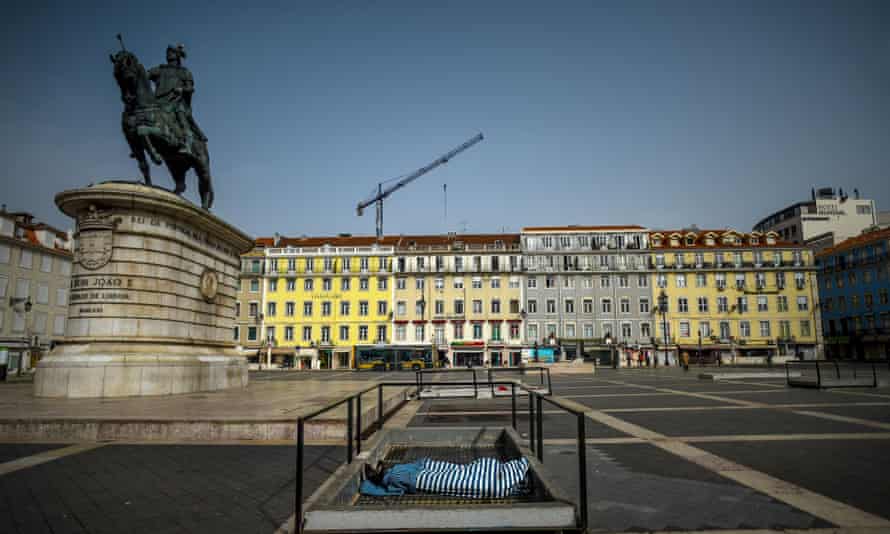
The days of the golden visa as it currently operates appear to be numbered. António Costa’s socialist government promised to remove residential properties in Lisbon, Porto and the Algarve from its scope but put off the reform until January 2022 to cushion the impact of the pandemic. Applications were up 13{30865861d187b3c2e200beb8a3ec9b8456840e314f1db0709bac7c430cb25d05} in 2021.
From next year, overseas buyers will still be able to put their money into Portuguese property for a tax advantage, but in regions of lower population density.
Even Lima concedes that for low-paid workers the options remain scarce. “It’s not enough to have the right to housing in the constitution,” he says. “I don’t know how any young person with a reasonable job can pay for a house in Lisbon today. Even if you earn €1,000 a month, you shouldn’t have to pay more than €300 [rent] – and this isn’t the reality in the city.
“Some people say our prices are only a fraction of those in Madrid, London or Paris – of course, but our standard of living is not that of the Spanish, British or French.”








